Whether you’re a seasoned real estate agent or a newbie to the industry, you’re well-aware of the power of a solid digital presence. With the majority of buyers starting their property journey online, it’s crucial to know where to plant your flag. Here, we’ve collected a stellar list of the top 10 real estate websites that are changing the game in the industry.
“In the digital age of real estate, the right website can make all the difference.”
Top 10 Real Estate Websites
Let’s dive headfirst into the pool of top-notch real estate websites out there. Here, we’ll compare, contrast, and evaluate. By the end of this article, you’ll know exactly where to go for your real estate needs.
1. Zillow: The Comprehensive Companion
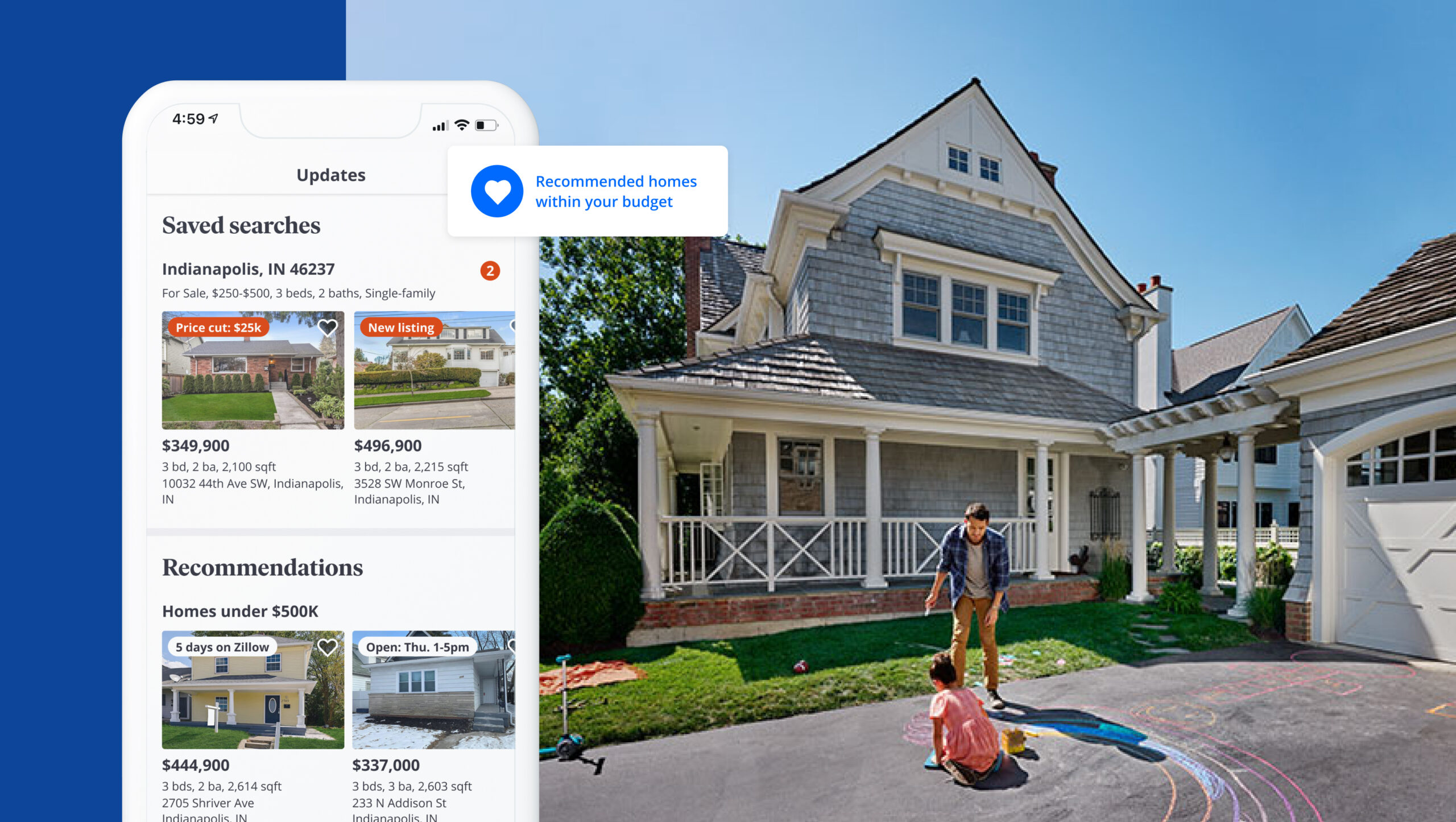
When it comes to offering a complete real estate experience, Zillow is undeniably a leading player. This robust platform not only provides an impressive range of listings, but it also serves as a major resource for real estate data.
The Power of Zestimate
One of the defining features of Zillow is its unique ‘Zestimate’ algorithm. This innovative tool provides an estimated market value for over 110 million homes in the U.S. By analyzing public data and user-submitted information, Zestimate offers insights into the potential worth of properties, enabling both buyers and sellers to make informed decisions.
Breadth and Depth of Listings
Although Zillow’s range of listings is broad, one critique it occasionally faces is the depth of its listings. While it’s true that the sheer volume of Zillow’s listings is impressive, there can sometimes be a lack of comprehensive details about each property.
However, despite this minor drawback, Zillow’s vast catalogue of properties and cutting-edge features like ‘Zestimate’ make it a preferred choice for many. Navigating the real estate market becomes much easier with Zillow by your side.
2. Realtor.com: The Reliable Real Estate Giant
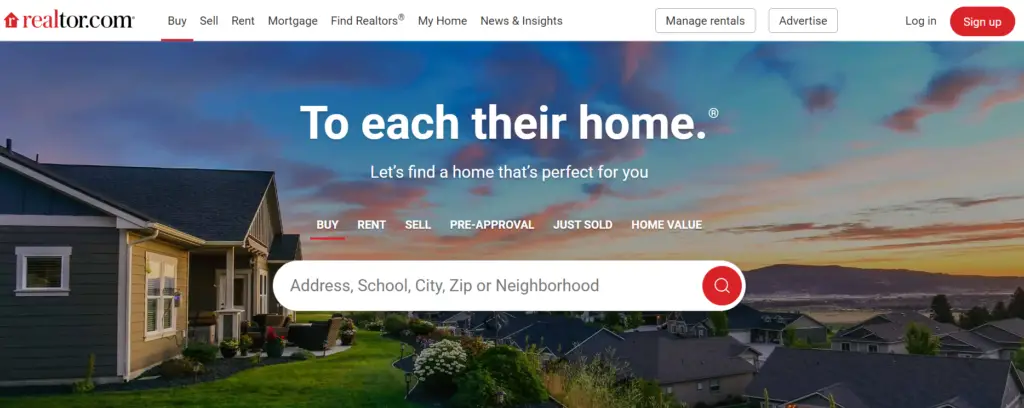
Realtor.com, a key player in the real estate market, boasts an impressive and extensive database of property listings, making it a must-visit website for both buyers and sellers. But, it’s not just about the volume of listings; it’s about the quality and reliability of the information they present.
Unparalleled Educational Resources
Beyond listings, Realtor.com is synonymous with unparalleled educational resources. From beginner’s guides to advanced tips for seasoned investors, Realtor.com acts as a comprehensive information hub. Regardless of your real estate knowledge, this site has something for everyone.
Realtor.com, your one-stop-shop for reliable real estate insights.
User Interface: Room for Improvement
While it’s a reliable protagonist in the sector, Realtor.com lags slightly behind when it comes to user interface. Though the site is functional, it could do with a touch of modernization to compete with some of its more user-friendly competitors. It’s not a deal-breaker, but it’s an area that could use a little polish.
Final Word
In conclusion, Realtor.com is a reliable and comprehensive resource for real estate information. It is a juggernaut in the industry, offering a broad spectrum of listings and educational resources. Yet, there is room for improvement in terms of user interface. Despite this, its credibility and vast offerings make it a top choice for many.
3. Redfin: The Tech-Forward Contender

Known for its tech-centric approach, Redfin has carved a niche for itself in the real estate industry. This innovative platform caters to the modern user by offering real-time data and a seamless interface, which truly sets it apart from its competitors.
Redfin Pros
- Real-time data: Redfin continually updates its database, providing users with up-to-the-minute information on properties. This feature is especially advantageous for buyers looking to make quick decisions in competitive markets.
- Seamless interface: The platform’s user-friendly design is intuitive and easy to navigate, making house hunting a more enjoyable and less stressful experience.
- Modern feel: Redfin’s sleek, modern design appeals to the tech-savvy generation. It also offers a mobile app for on-the-go property browsing.
Redfin Cons
- Limited coverage: While Redfin is a great resource, its coverage is not as extensive as some other real estate websites. This means that in some areas, users might find their options limited.
Overall, Redfin is a modern, tech-friendly platform that sets itself apart with real-time data and a streamlined interface. However, its limited coverage area may not suit everyone’s property search needs.
4. Trulia: The Neighborhood Navigator

Trulia distinguishes itself in the crowded real estate website scene with its unique emphasis on local neighborhoods. This allows users to dive deep into the details of potential future homes, exploring aspects such as local schools, safety measures and amenities directly within the platform.
Pros of Using Trulia
- Neighborhood Focus: Trulia excels in providing rich, detailed information about the neighborhoods. This feature is a boon for those looking to understand the community they would be moving into.
- Detailed Insights: Whether it’s the quality of local schools or the level of safety and crime in the area, prospective buyers or renters get valuable insights to make informed decisions.
- Amenities: Trulia provides a comprehensive list of nearby amenities, from parks and recreational centers to restaurants and shopping malls, aiding users to visualize their lifestyle in a particular area.
Cons of Using Trulia
- Listing Limitations: While Trulia’s focus on neighborhoods is commendable, its property listings are not as exhaustive as some of its competitors. This might limit the housing options available for users on the platform.
In summary, Trulia offers a great deal of neighborhood information that can be invaluable for those looking to move. However, users may need to consider other websites as well for a more comprehensive list of available properties.
5. LoopNet: The Commercial Hub

For commercial real estate, LoopNet is the website of choice. It has a solid range of commercial listings but lacks options for residential properties.
Pros
- Comprehensive Commercial Listings: LoopNet excels in providing a vast array of commercial property listings. It is a reputable source for finding everything from office spaces to retail locations.
- Accessible and User-friendly: The platform is designed to be easy to use, making it simple for users to search for and find the commercial properties that meet their criteria.
- Advanced Search Options: LoopNet offers advanced search options that allow you to filter results by a variety of categories such as property type, location, price, and more.
Cons
- Limited Residential Listings: LoopNet falls short in the residential real estate sector. It doesn’t offer the same variety or volume of listings compared to other real estate websites.
- Fewer Search Filters for Residential Properties: The search options for residential properties are not as extensive as those for commercial listings, making it more challenging to find specific types of homes or apartments.
While LoopNet shines in the commercial real estate market, it has room to grow in the residential sector. But for those focused on commercial properties, LoopNet is a valuable tool in the real estate toolbox.
6. Homes.com: The Underdog

While Homes.com may not have the widespread recognition of some of its peers, the website has carved a niche for itself on account of its user-friendly interface and solid educational content. Its minimalist design prioritizes user experience, making it a joy to navigate and search for properties.
Pros of Homes.com
- Easy to use: The website’s user-friendly layout ensures that even first-time visitors can easily find their way around.
- Educational content: Homes.com provides comprehensive educational resources, helping homebuyers understand complex concepts and terms related to real estate.
- Detailed property listings: Each listing on Homes.com comes with a wealth of information, including property details, local school data, and nearby amenities.
Cons of Homes.com
- Limited range of listings: Homes.com could improve its service by expanding its property listings to provide more choices for users.
- No virtual tours: Unlike some other real estate websites, Homes.com does not offer virtual tours of properties.
In conclusion, while Homes.com could improve in certain areas, it is a commendable resource for homebuyers looking for a platform that is intuitive to navigate and abundant in educational content. Its potential enhancements, such as an expanded range of listings and the introduction of virtual tours, could elevate the website to compete with larger players in the real estate digital sphere.
7. Apartments.com: The Rental Repository
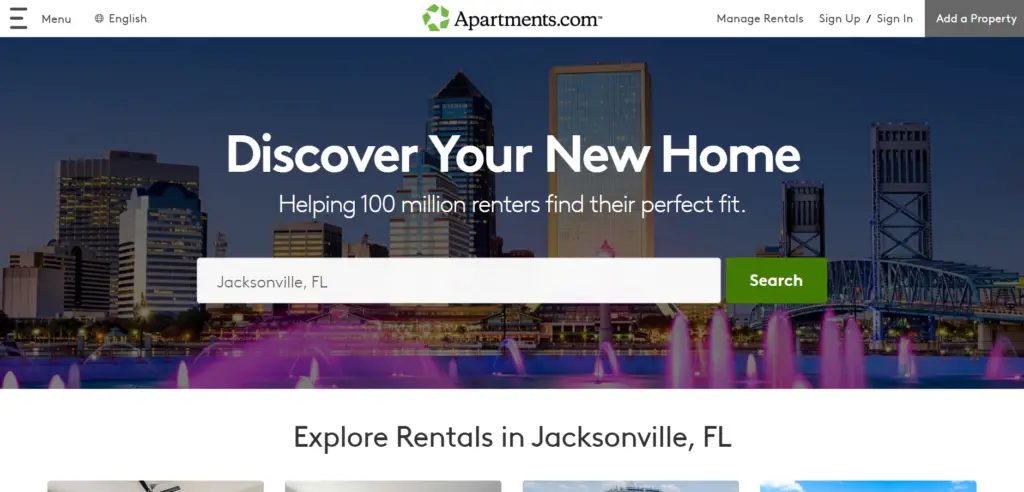
If you’re hunting for rentals, Apartments.com is a top destination. It has detailed rental listings but falls short for users looking for properties to purchase.
Pros of Using Apartments.com
- Wide Range of Listings: Apartments.com includes a broad range of listings that span across various locations, sizes, and price points. This diversity makes it possible for any potential renter to find an apartment that suits their unique needs and preferences.
- User-Friendly Interface: The platform’s interface is designed to offer an easy, seamless navigation experience. With features like advanced search filters, it’s easy for users to narrow down their options to find exactly what they are looking for.
- Informative Content: In addition to apartment listings, Apartments.com also provides helpful resources and articles for renters. Whether you’re a first-time renter or a seasoned one, you’ll find information that’s both valuable and relevant.
Cons of Using Apartments.com
- Spammy Listings: One of the major drawbacks of Apartments.com is the presence of spammy listings. While the platform does its best to regulate these, a few still manage to slip through the cracks. This could potentially cause frustration and confusion for users.
- Lack of Verification: Another issue is that not all listings are thoroughly verified. This means that users may occasionally come across misrepresented or inaccurate information about an apartment.
While Apartments.com is a valuable platform for apartment hunting, it’s important for users to be aware of the potential hurdles they may encounter. That being said, with careful navigation and diligent research, it can still be a powerful tool in finding your dream apartment.
8. MLS.com: The Industry Standard
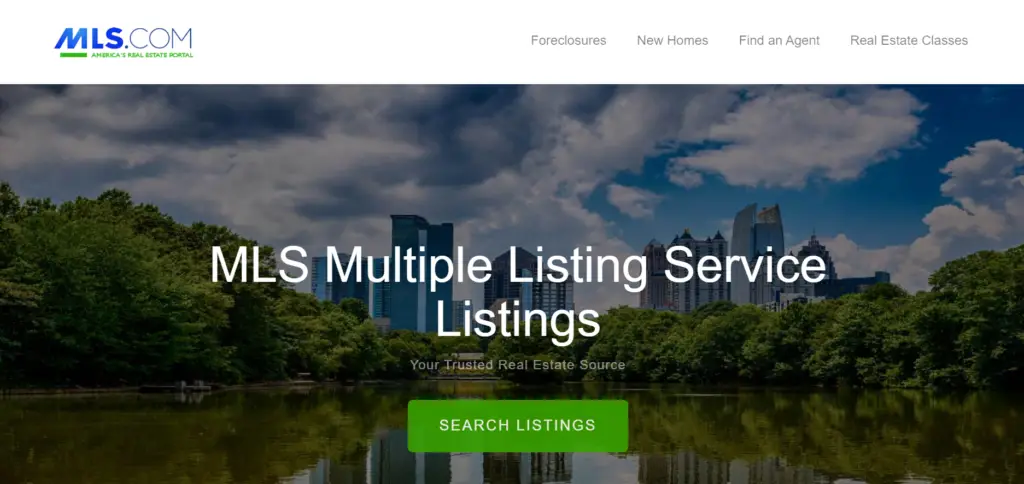
MLS.com is a favorite among real estate professionals for its accurate listings. It can be somewhat complex for new users, though.
| Pros | Cons |
|---|---|
| Extensive Database: MLS.com boasts one of the largest property databases in the industry. You can find a plethora of listings, from residential to commercial properties. | Regional Limitations: While MLS.com is extensive, it does have regional limitations. Not all listings are available in all areas, which can be limiting for some users. |
| Efficiency: The site is designed for simplicity and usefulness. Its user-friendly interface allows agents to browse, sort, and filter listings with ease. | Lack of Unique Features: MLS.com may not offer as many unique features as some of its competitors. It’s a solid, straightforward platform, but it may not have the “wow” factor some users are looking for. |
| Reliability: MLS.com is known for its reliable, up-to-date listings. Agents can trust the information they find on this site. | Cost: For all its merits, MLS.com is not free. Agents need to pay for access, which may be a con for those on a tighter budget. |
9. RealtyTrac: The Foreclosure Finder
For foreclosure and off-market properties, RealtyTrac is the go-to site. It’s specialized, so it’s not for everyone, but it’s ideal for investors and bargain hunters.
Pros of RealtyTrac
- Extensive Foreclosure Listings: RealtyTrac offers one of the most comprehensive databases for foreclosure listings, making it an invaluable resource for investors or home buyers interested in this segment of the market.
- In-Depth Property Details: Each listing is accompanied by detailed property information, including the specifics of the foreclosure or auction process, giving users a clear understanding of what they’re stepping into.
- Informative Resources: Aside from listings, RealtyTrac provides a wealth of knowledge in the form of articles, guides, and industry news to keep users informed.
Cons of RealtyTrac
- Limited Scope: As RealtyTrac is specialized in foreclosures and auctions, it may not cater to users seeking traditional property listings. It’s not a one-stop shop for all real estate needs.
- Subscription Fee: Accessing the full details of listings on RealtyTrac requires a subscription, which could be a barrier for some users.
- Niche Market: RealtyTrac’s focus on foreclosures and auctions means that it may be less useful for those not interested in these types of properties.
While RealtyTrac excels in its niche of foreclosures and auctions, its specialized focus means it might not be the best fit for everyone. If you’re seeking a broader range of real estate options, you might need to complement it with other resources.
10. ForSaleByOwner.com: The DIY Dream
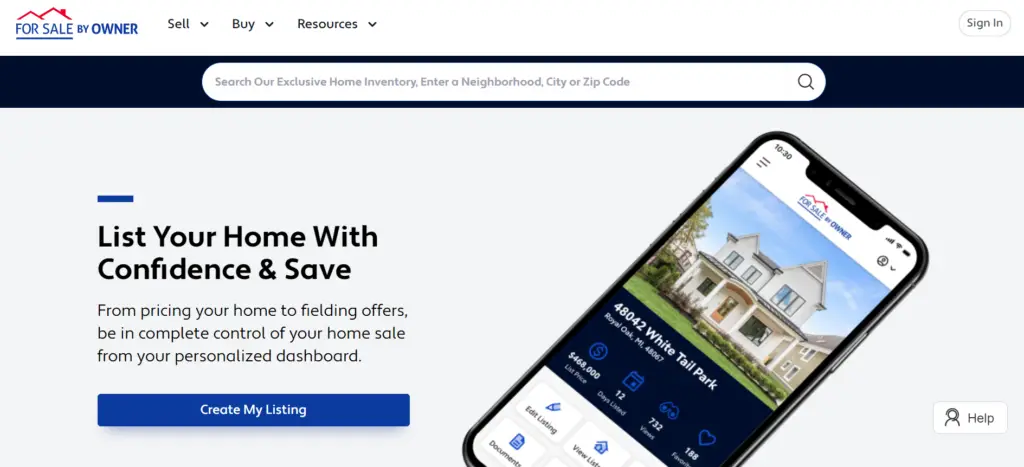
Finally, for those looking to sell their home independently, ForSaleByOwner.com is a helpful resource. It’s not suitable for those looking for an agent-assisted sale, but it’s a dream for the DIY-savvy seller.
Pros of ForSaleByOwner.com
- Direct Access to Buyers: The platform offers homeowners the opportunity to directly interact with potential buyers without any middlemen, which could lead to quicker transactions.
- Savings on Agent Commissions: Bypassing agents means you can save on hefty commission fees typically associated with traditional real estate transactions.
- Full Control: Homeowners have complete control over every aspect of the sale, from setting the asking price to scheduling viewings and negotiating offers.
Cons of ForSaleByOwner.com
- Increased Responsibility: The entire sales process falls on the homeowner. This means dealing with marketing, buyer inquiries, negotiations, and legalities, which can be overwhelming for some.
- Lack of Professional Guidance: Without the expertise of a real estate agent, homeowners risk missing key aspects of the selling process, such as pricing accurately or understanding legal documents.
- Time-Consuming: Given the DIY nature of the site, selling your home may take longer than it would through an agent, especially if you’re new to real estate transactions.
Remember, while ForSaleByOwner.com might be a cost-saving option, it requires a hands-on approach and a decent understanding of real estate transactions. Consider your personal circumstances and capacity to handle the sale before deciding whether this platform is right for you.
Each of these websites has its strengths and weaknesses. The key is to identify your specific needs and choose the site that best fits. Happy house hunting!
So, there you have it. These are the top 10 real estate websites that you, as an agent, need to be familiar with. Now, it’s time to get out there and make your mark in the digital world of real estate!